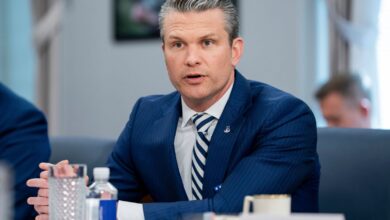Hungarians choose between nationalism and pluralism in key elections

Hungarian voters are choosing on Sunday whether to give national Prime Miner Viktor Orban a fourth term in office or to entrust the government to a new six-party opposition alliance in an election overshadowed the war in neighboring Ukraine.
The polls come amid accusations opposition groups and international observers that Orban and his right-wing Fidesz party are favoured a widespread pro-government bias in the public media and heavy gerrymandering of election dricts.

Russia’s invasion of Ukraine has, however, given the opposition United For Hungary a handhold. Its candidate for prime miner, Peter Marki-Zay, has highlighted Orban’s close political and business relations with Moscow and called for Hungary to act in concert with EU partners on sanctions and weapons deliveries.
The latest poll Zavecz Research showed Fidesz leading with 39% support against 36% for United for Hungary, while one-fifth of voters were undecided.
1 p.m local time (1100 UTC), around 40% of Hungary’s nearly 7.7 million eligible voters had cast a ballot, according to the National Election Office.
ontent_priority_driven exkeyword=”Check, Out, Express, Premium” link=”https:///about/express-premium/” hlabel=”Check Out Express Premium” hlink=”https:///about/express-premium/” pid=”6462060″ mlabel=”Click here for more” mlink=”https:///about/express-premium/”%5D
The figure prompted both sides to take to social media to urge their supporters to get out andvote.
What is Orban’s stance on the Ukraine conflict?
Orban, a longtime ally of Russian President Vladimir Putin, has stated that Hungary must remain neutral and maintain its close economic ties with Moscow, including continuing to import Russian gas and oil.
Although he has supported an EU decision to send arms to Ukraine, he has rejected allowing weapons to be shipped from Hungarian territory, saying such a move could pose a security risk.
“This isn’t our war, we have to stay out of it,” Orban said at his final campaign rally on Friday.
On Sunday, while casting his vote in the capital, Budapest, he described the election as a choice between peace and war and again accused his opponents of trying to drag Hungary into the Ukraine conflict.
Asked about his ties with Moscow and Putin, Orban replied: “I am standing on the basis of the Hungarian national interests; I am pro-Hungarian.”
What does the opposition say?
Marki-Zay has accused Orban of siding with Putin in the conflict and said the prime miner’s moves had left him isolated within the EU, with which Orban has frequently anyway been at loggerheads.
The opposition leader has cast the poll as a choice between East and West, charging Orban with turning Hungary toward Russia and away from the EU where it belongs.
According to Marki-Zay, Orban has undermined democratic rights and overseen rampant government corruption in the process.
Orban, who sees himself as an advocate of “illiberal democracy,” has taken control of many of his country’s democratic institutions while claiming he is defending European Chrendom against Muslim migrants, progressive trends and the “LGBTQ lob.” These attitudes have frequently brought him into conflict with the EU.
United for Hungary, for its part, is calling for a new political culture based on pluralic governance and the restoration of damaged alliances with the EU and NATO.
The opposition alliance includes the left Democratic Coalition, the liberal Momentum party and the Jobbik party, the latter having turned from being far-right to moderate.






